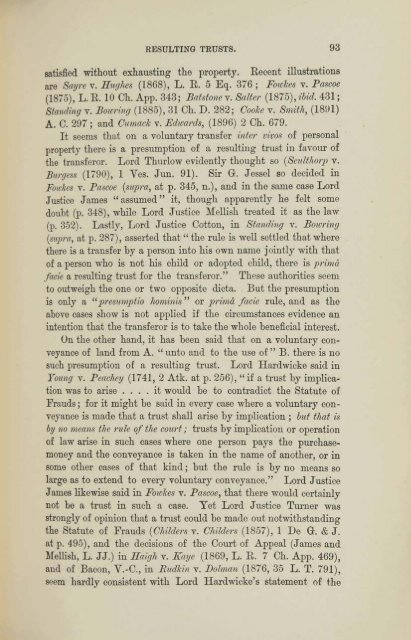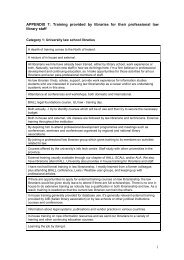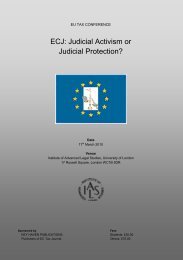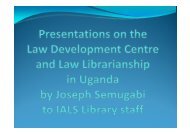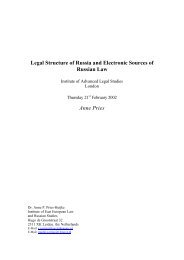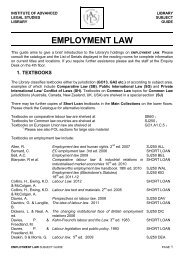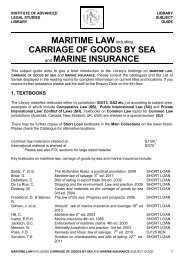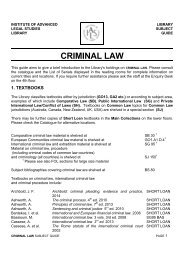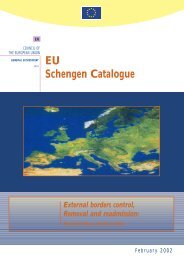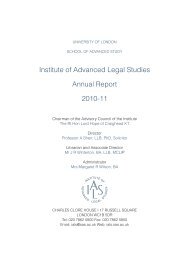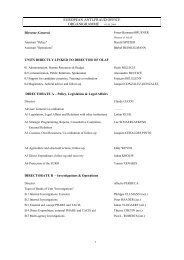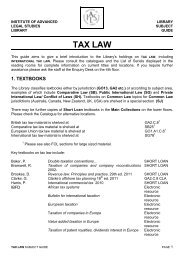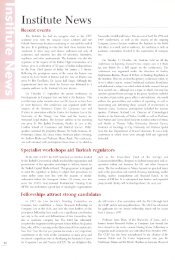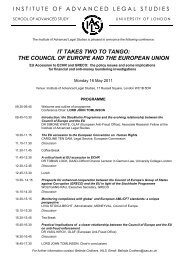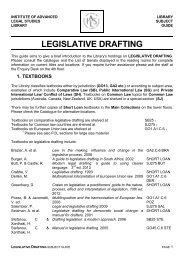a thesis - Institute of Advanced Legal Studies
a thesis - Institute of Advanced Legal Studies
a thesis - Institute of Advanced Legal Studies
You also want an ePaper? Increase the reach of your titles
YUMPU automatically turns print PDFs into web optimized ePapers that Google loves.
RESULTING TRUSTS. 93<br />
satisfied without exhausting the property. Eecent illustrations<br />
are Sayre v. Hughes (1868), L. E. 5 Eq. 376 ; Fowkes v. Pascoe<br />
(1875), L. E. 10 Ch. App. 343; Batstonc v. Satter (1875), ibid. 431;<br />
Standing v. Boicring (1885), 31 Ch. D. 282; Coolie v. Smith, (1891)<br />
A. 0. 297 ; and Cumack v. Edwards, (1896) 2 Ch. 679.<br />
It seems that on a voluntary transfer inter vivos <strong>of</strong> personal<br />
property there is a presumption <strong>of</strong> a resulting trust in favour <strong>of</strong><br />
the transferor. Lord Thurlow evidently thought so (Sculthorp v.<br />
Burgess (1790), 1 Yes. Jun. 91). Sir G. Jessel so decided in<br />
Fowkes v. Pascoe (supra, at p. 345, n.), and in the same case Lord<br />
Justice James "assumed" it, though apparently he felt some<br />
doubt (p. 348), while Lord Justice Mellish treated it as the law<br />
(p. 352). Lastly, Lord Justice Cotton, in Standing v. Souring<br />
(supra, at p. 287), asserted that " the rule is well settled that where<br />
there is a transfer by a person into his own name jointly with that<br />
<strong>of</strong> a person who is not his child or adopted child, there is prima<br />
facie a resulting trust for the transferor." These authorities seem<br />
to outweigh the one or two opposite dicta. But the presumption<br />
is only a " presumptio hominis " or prima facie rule, and as the<br />
above cases show is not applied if the circumstances evidence an<br />
intention that the transferor is to take the whole beneficial interest.<br />
On the other hand, it has been said that on a voluntary conveyance<br />
<strong>of</strong> land from A. " unto and to the use <strong>of</strong> " B. there is no<br />
such presumption <strong>of</strong> a resulting trust. Lord Hardwicke said in<br />
Young v. Peachey (1741, 2 Atk. at p. 256), " if a trust by implication<br />
was to arise .... it would be to contradict the Statute <strong>of</strong><br />
Frauds; for it might be said in every case where a voluntary conveyance<br />
is made that a trust shall arise by implication ; but that is<br />
by no means t/ie rule <strong>of</strong> the court; trusts by implication or operation<br />
<strong>of</strong> law arise in such cases where one person pays the purchasemoney<br />
and the conveyance is taken in the name <strong>of</strong> another, or in<br />
some other cases <strong>of</strong> that kind; but the rule is by no means so<br />
large as to extend to every voluntary conveyance." Lord Justice<br />
James likewise said in Fowkes v. Pascoe, that there would certainly<br />
not be a trust in such a case. Yet Lord Justice Turner was<br />
strongly <strong>of</strong> opinion that a trust could be made out notwithstanding<br />
the Statute <strong>of</strong> Frauds (Childers v. Childers (1857), 1 De GK & J.<br />
at p. 495), and the decisions <strong>of</strong> the Court <strong>of</strong> Appeal (James and<br />
Mellish, L. JJ.) in Haigh v. Kaye (1869, L. E. 7 Ch. App. 469),<br />
and <strong>of</strong> Bacon, Y.-C., in Eudkin v. Dolman (1876, 35 L. T. 791),<br />
seem hardly consistent with Lord Hardwicke's statement <strong>of</strong> the


